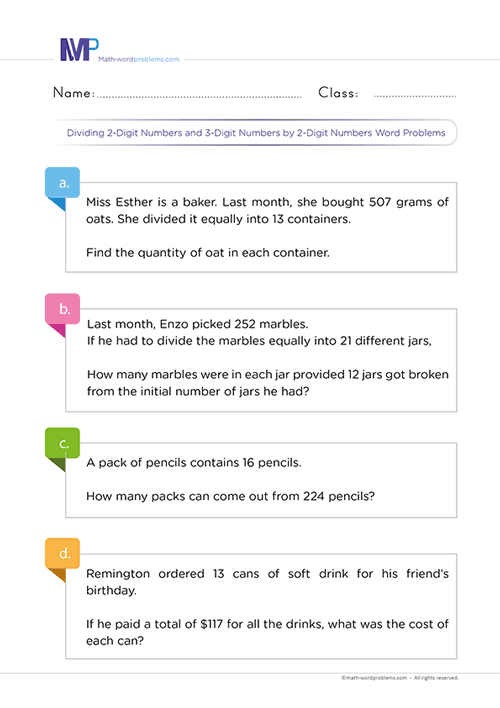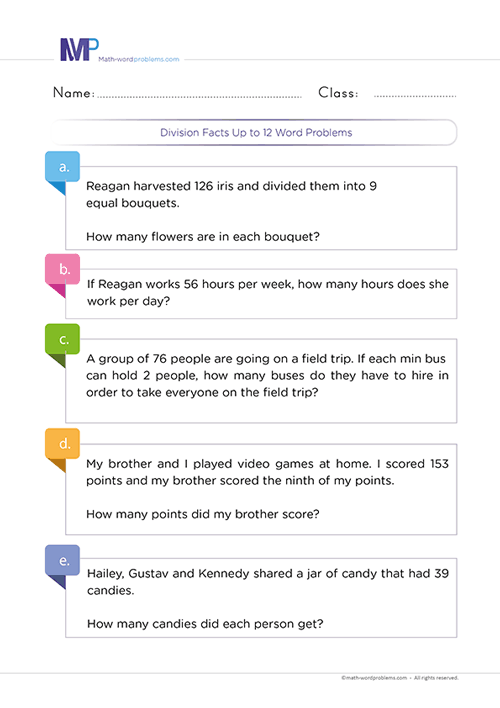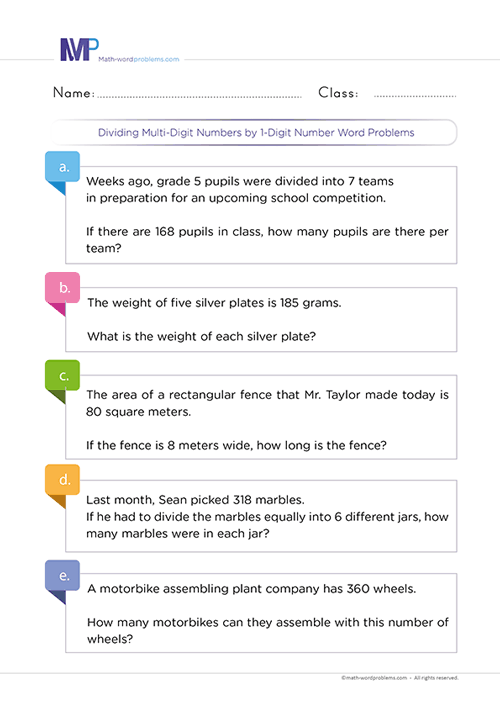 Easy way to divide 2-digit numbers and 3-digit numbers by 2-digit numbers word problems
Easy way to divide 2-digit numbers and 3-digit numbers by 2-digit numbers word problems
Here is a unique and easy way to divide 2-digit numbers and 3-digit numbers by 2-digit numbers word problems efficiently. This step-by-step solving process below provides a helpful structure to guide young math learners in quickly dividing 2 and 3-digit numbers by 2-digit word problems.
However, this simple guide will solve all the problems that learners face in handling division word problems and every other word they encounter.
Steps on how to solve division of 2-digit numbers and 3-digit by 2-digit numbers word problems
Hey kids, here are fantastic steps on how to solve division of 2-digit numbers and 3-digit numbers by 2-digit numbers word problems.
As we said earlier, these fun steps will encourage kids to think out of the box when encountering complex word problems daily. They will also become more thoughtful and eager to combat more and more real-life word problems.
For this reason, we have attached some supportive real-world examples to illustrate how these steps work.
Step 1: IDENTIFY THE PROBLEM
To identify the problem, you’ll have to read the word problem very carefully to know what the problem wants you to solve.
Also, try to find the essential numbers and keywords in the word problem. Such keywords that will enable you to know that you need to perform a Division Operation include: - divide, half, evenly, every, per, parts, out of, the quotient of, the ratio of, how many in each, equal parts, cut up, average, as much, etc.
Note: One key Element for learners to understand is that they should not always rely on keywords alone. That is to say; the same keyword can have different meanings in different word problems.
For this reason, we reiterate on the importance of reading the question very carefully to understand the situation that the word problem is describing, then figure out exactly which operation to use
Step 2: STRATEGIZE OR GATHER RELEVANT INFORMATION
How do you tackle this problem?
- First, from the keyword(s) in the word problem, you will know whether you need to perform a Division Operation or any other operation.
- Besides this, you must not count only on keywords. Endeavor to understand the situation that the problem is describing before brainstorming on how to go about solving it.
- Next, after knowing which operation you will perform, build short expressions/sentences to represent the given word problem.
Step 3: SET UP
Now, write down a numerical equation representing the information given in the word problem.
Step 4: PROVIDE A SOLUTION
From step 3 above, divide the values using the long division method. Always remember to include the sign, if any.
Step 5: CHECK YOUR WORK
Finally, check if your answer makes sense. For example, estimate the answer and see if it is close to what you expected. However, if the answer is not what you expected, go back to step one and start all over again.
Examples on how to divide 2-digit numbers and 3-digit numbers by 2-digit numbers word problems.
Example one
Step 1: First, the important numbers here are 605 and 12. Also, the most important keyword(s) found in the word problem is “per.”
Step 2: Next, how will you solve the problem? Right now, the situation the problem is describing and the keyword(s) found in the word problem call for you to perform a division operation.
So, build short sentences to represent the given word problem.
- Number of flowers the florist has = 605
- Number of flowers per bouquet = 12
- Therefore, the number of bouquets of flowers he can make = number of flowers the florist has ÷ number of flowers per bouquet
Step 3:Write down a numerical expression to represent the bolded sentence in step 2 above to solve this word problem:
→ 605 ÷ 12 = ?
Step 4: From step 3 above, divide the values using the long division method, not forgetting the unit of measurement, if any.
So, he will make 12 bouquets of flowers, and 5 flowers will be left
Step 5: Finally, check if your answer makes sense. For example, estimate the answer and see if it is close to what you expected. However, if the answer is not what you expected, go back to step one and start all over again.
Example two
Step 1: After thoroughly studying the question, you’ll notice that the important numbers are 18, 63, and 27. Also, the keyword(s) found in the word problem is “each .”
Step 2: Next, how will you solve the problem? Right now, the situation the problem is describing and the keyword(s) found in the word problem call for you to perform a division operation.
Also, note that the problem describes a situation whereby we’ll need to combine two numbers at some point, thus calling for an addition operation.
So, we can equally refer to this problem as a multi-step word problem.
With this in mind, form short sentences to represent the given word problem.
- Number of girls in the class = 63
- Number of boys in the class = 27
- The total number of pupils in the class = Number of girls in the class + number of boys.
- Number of teams = 18
- Therefore, the number of pupils per team = the number of pupils in class ÷ the number of teams
Step 3: Write down numerical equations to represent the bolded statement in step 2 above to solve this word problem:
→ 63 + 27 = ?
→ 90 ÷ 18 = ?
Step 4: From step 3 above
- First, add the first equation.
- Then, use the result in the first equation to solve the second equation. Also, to solve the second equation, divide the values by using the long division method. Also, do not forget to add the unit of measurement to your final answer, if any.
So, there are 5 pupils per team
Step 5: Finally, check if your answer makes sense. For example, estimate the answer and see if it is close to what you expected. However, if the answer is not what you expected, go back to step one and start all over again.






